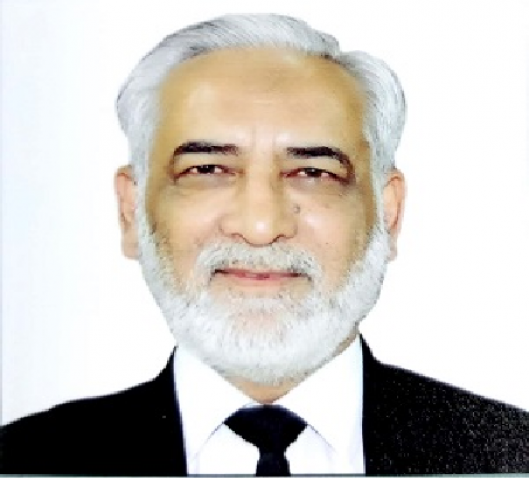Justice Alam to hang up spurs tomorrow
SC judge served on superior courts for over 22 years

Supreme Court’s senior puisne judge Mushir Alam is retiring tomorrow (Tuesday) after serving on the country’s superior courts for 22 years.
Justice Alam was appointed as an additional judge of the Sindh High Court in April 1999.
He was among those SHC judges who had refused to take oath under November 3, 2007 provisional constitutional order (PCO), promulgated by military ruler General Pervez Musharraf.
He had also declined an offer from the last PPP government for his restoration under the so-called “Naek formula” presented by PPP’s legal wizard Farooq H Naek.
After restoration of the judiciary, Justice Alam was elevated as the SHC chief justice in 2013.
Interestingly, incumbent Chief Justice of Pakistan Gulzar Ahmed, who also served as a SHC judge, was junior to him but was elevated to the SC before him.
After his retirement, Justice Qazi Faez Isa will become a member of the Supreme Judicial Council (SJC) – a constitutional forum that hears references against superior court judges – while Justice Sardar Tariq Masood will become a member of the Judicial Commission of Pakistan (JCP), a body with a key role in judge’s appointment.
A full-court reference will be held in his honour on August 17 (tomorrow) in which Justice Gulzar Ahmed, the Attorney General for Pakistan and superior bars’ representatives will give speeches on his contributions.
Read: Justice Mazhar sworn in as Supreme Court judge
However, the Supreme Court Bar Association (SCBA) has already decided not to host a farewell dinner in his honour due to his endorsement of the nomination of a Sindh High Court junior judge – Justice Muhammad Ali Mazhar – as a Supreme Court Judge last month.
He will be remembered as among the judges who always allowed counsels to fully express their views. Lawyers never complained that he did not give them a chance to present their arguments properly. Even as head of a bench, he encouraged junior judges to author judgments in high profile cases.
Justice Mushir Alam was the presiding judge of a bench that gave ruling in the famous Faizabad case in which direction was given to authorities to proceed against military officials who were involved in the illegal act.
Similarly, he headed the bench which rejected the National Accountability Bureau’s (NAB) appeal against a Lahore High Court (LHC) judgment stopping the graft buster to reopen an inquiry into Rs1.2 billion Hudabiya Paper Mills case filed against the Sharif family.
Last year, a division bench led by him took suo motu notice to examine NAB chairman’s authority to appoint director generals in the anti-graft body sans rules and regulations. Interestingly, in all above mentioned cases, Justice Qazi Faez Isa authored the judgments.
Justice Alam was also a member of the famous Memogate Commission.
Last year, the retiring judge also gave a ruling which paved the way for the Supreme Court Bar Association (SCBA) members to acquire land for developing a society. However, one section of lawyers raised objection to his accepting a government offer to get a one kanal plot in Sector D-12 Islamabad.
Interestingly, he accepted the plot, when the judgment was reserved on the Federal Government Housing Employees Authority (FGEHA) petition against a Islamabad High Court (IHC) ruling. The IHC had ruled against acquisition of the land for the society by the FGEHA in Sectors F-14 and F-15 from locals at cheaper rates.
Justice Alam was also heading the bench, which rejected the Sindh government's petition against release and acquittal of the accused in the Daniel Pearl case.
While authoring a judgment, he in 2019 urged the high courts to exercise jurisdiction under Article 199 of the Constitution in white-collar crime cases only to prevent miscarriage of justice and abuse of the National Accountability Ordinance (NAO), 1999.
Sindh High Court Bar Association (SHCBA) President Salahuddin Ahmed said Justice Alam was an honest judge who gained universal respect and admiration for his principled stance during the lawyers' movement.
"He did not take oath under Musharraf’s second PCO and, later on, was one of the few judges who refused to rejoin the judiciary until such time as the lawful CJP, Iftikhar Chaudhry, was restored.
“The public acclaim he garnered for his stance was demonstrated by a unique 3-minute-long standing ovation he received when he was invited as the chief guest at the SHCBA annual dinner," he said.
Read more: In a first, female judge nominated for SC slot
He said Justice Alam was ready to embrace technology and new ideas in the administration of justice and as the SHC chief justice he took various steps to modernize the court system.
“He also led administrative changes in the identification and verification of litigants and sureties that hugely reduced cases of fraud and has had a lasting impact in all courts of Sindh.”
However, the SHCBA president lamented that unfortunately the latter part of his career was not distinguished by the same boldness and vigor that characterized the former part and he was perceived as being too readily persuaded by his peers.
"Despite best intentions, he was unable to introduce any measures to structure or to reduce the level of unchecked discretion available in judicial appointments and many in the bar were disappointed by his stance on the seemingly arbitrary appointments of junior judges and ad hoc judges in the apex court."
Commenting on the legacy left by Justice Mushir Alam, Hasan Mann Advocate said: “He has been an average judge throughout who never rendered any landmark judgment during his 22 years long career as judge of the superior courts of this country.”
His critics also say that Justice Alam never spoke his mind and always towed the line of the most vocal junior colleague even when heading the bench.



















COMMENTS
Comments are moderated and generally will be posted if they are on-topic and not abusive.
For more information, please see our Comments FAQ